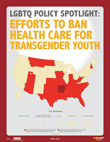Policy Spotlight: Bans on Best Practice Medical Care for Transgender Youth
As political attacks on LGBTQ people continue in state legislatures, MAP's policy spotlight about bans on medical care for trans youth provides an update to our 2021 report. MAP's policy experts are available to discuss data on this political landscape and to provide comment.
The recent wave of bans attempting to block best practice medical care for transgender youth has been fertile political ground in an election year. Prior to 2020, not a single state had considered legislation to ban best practice medical care for trans youth.
Despite the COVID-19 pandemic, 22 states considered this type of legislation in 2021 with one state, Arkansas, passing such a bill into law. Unfortunately, this trend has only continued this year. According to new research from The Williams Institute, more than 58,000 transgender youth are currently at risk of losing access to best practice medical care due to proposed and enacted state bans and policies.
For more on these efforts, read MAP's 2021 spotlight report, including the graphic below showing state efforts prior to 2022.
Bans on best practice medical care represent one of the most extreme and coordinated political attacks on transgender people in recent years. These bills target trans youth by blocking their access to best practice medical care-care that is backed by years of rigorous research and endorsed by the American Academy of Pediatrics, the American Medical Association, and other leading health authorities.
What's happened in 2022?
This year, at least 17 states have introduced bans on best practice medical care for transgender youth.
In February, Texas took executive action to attempt to restrict best practice medical care for transgender youth, though these actions do not change the law in Texas or actually ban this care. The governor ordered the state's Department of Family and Protective Services to begin investigating families of transgender for potential child abuse. These investigations were later halted by a statewide injunction.
While not legally binding, these executive actions have nonetheless caused harm to families of trans youth in Texas. As a result of the scale and impact of these actions, we've added a new category to our map on medical care bans for transgender youth to reflect this development. However, it is important to emphasize that these actions have not changed the law in Texas. This means that medical care for trans youth is still legal in the state.
In March, Arizona banned best practice surgical care for minors, though the bill does not go into effect for another year. And just last month, Alabama not only became the third state to ban best practice care for trans youth, but also became the first state to make it a felony-punishable by up to 10 years in prison and a fine of up to $15,000-for medical professionals to provide best practice care for people under 19.
Bills that seek to ban or criminalize best practice medical care for transgender youth would cause real and direct harm to the health and wellbeing of trans youth. Research clearly shows that denying trans youth access to the support and health care they need would only increase the likelihood that trans youth may experience depression, isolation, and risk of self-harm or suicidal thoughts or behavior.
Specifically, transgender youth whose families support their gender identity have a 52% decrease in suicidal thoughts, a 46% decrease in suicide attempts, and significant increases in self-esteem and general health.
Best practice medical care is life-saving care
Transgender youth are part of our communities. Transgender children, like any children, have the best chance to thrive when they are supported and can get the health care they need.
These medical care bans are a political attack on these children. Decisions about health care should be made in accordance with current medical best practices, and those decisions should be made by transgender youth, their parents, and their health care providers-not by politicians
About MAP: MAP's mission is to provide independent and rigorous research, insight and communications that help speed equality and opportunity for all. MAP works to ensure that all people have a fair chance to pursue health and happiness, earn a living, take care of the ones they love, be safe in their communities, and participate in civic life. www.lgbtmap.org








